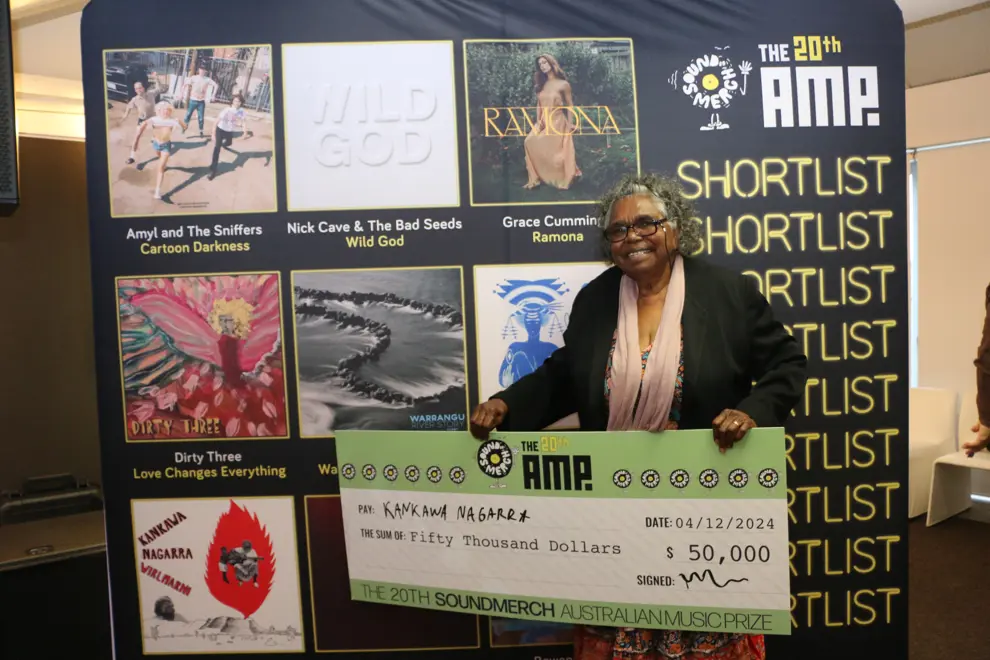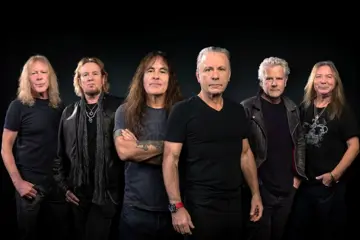The word ‘prestigious’ gets thrown around a lot, but it’s the perfect description of the Australian Music Prize. In its 20th year, the award has risen to the pinnacle in recognising Australian music excellence with its process of whittling down over 600 eligible albums to a shortlist of nine, an unenviable but privileged task of the judges.
In a relatively small gathering at the APRA AMCOS headquarters in Sydney, the 27-strong judging panel, along with a few nominees and other industry representatives, got together to celebrate these nine albums and the variety, diversity, and quality of Australian music in the past year.
“I’m not usually nervous, but I am today,” admitted Rowena Wise before the announcement, shortlisted for her debut record, Senseless Acts Of Beauty. She continued, “I think things like this are really important to help the arts and music community recognise achievements.”
"It means a great deal to us to be recognised by AMP," Nick Cave & The Bad Seeds declared after also being shortlisted for Wild God, sitting amongst other luminaries like Amyl & The Sniffers, The Dirty Three, Hiatus Kaiyote and DOBBY.
Don't miss a beat with our FREE daily newsletter
Grace Cummings, shortlisted for her third album RAMONA, was excited to attend, especially as she would be playing a show in her hometown of Melbourne the following night.
“I feel really quite shocked actually! I think someone's made a mistake down the line,” Cummings said, being overly humble. She continued, “Some of the albums I've been really fanging as well. Like, I think I'm amongst some really amazing company; I’ve got a little bit of an imposter thing going on!”
Following a surprise set from Brisbane’s Dean Brady, showcasing his smooth voice on some new music, Yuin and Thunghutti man and one-third of hip-hop group 3%, Nooky began proceedings. He went through the shortlisted albums with representatives stepping up for the majority of artists who were overseas. “Sounds like I should be sent overseas to win one of these”, Nooky joked. His tongue-in-cheek and relaxed style was a refreshing change from similar award nights.
Despite not attending the event, Audrey Powne wrote some words reflecting her appreciation for having her debut record, From The Fire, shortlisted. The fantastic record, filled with future jazz, her own trumpeting skills and her silky soul voice, was a welcome addition to the final nine, again reflecting the diversity of the award.
The director of Soundmerch, Tim Everist - with a big novelty cheque in hand, proudly announced that the prize for the night had been increased from $30,000 to $50,000 for the winner. The amount would mean more to some than others, but certainly a considerable amount to be given away. Considering the AMP was originally based on the UK’s Mercury Music Prize, the prize money now effectively matches the £25,000 ($49,307 AUD) awarded for that prize.
There was one album on the shortlist that was like no other. Kankawa Nagarra, an 80-year-old elder from the traditional lands of the Gooniyandi and Walmatjarri people in the north of Western Australia, created an album that immerses the listener in her home of Wangkatjungka, a community situated 100km south-east of Fitzroy Crossing (or a 6-hour road trip to the east of Broome)
Wirlmarni (meaning ‘disappearing’) is a collection of songs recorded on her ancient lands with a guitar, birds, and a real sense of place. Inspired by the blues she listened to in her youth, her soulful voice carries the weight of her past, her community, and her deep empathy for the struggles of others.
Speaking before the presentation, Kankawa shared, “We’re not too sure how it happened; it’s something quite extraordinary!”
The album came to life with the assistance of well-loved musician Darren Hanlon, who helped bring out the raw sounds you can hear on the record. “We decided on very, very raw stuff this time. Just a guitar and me in the wild, the wind and the children and community life.” She continued, “That is where you were originally from, as an Indigenous person, you know, so why not just go out there and be one with nature and the birds and the people?”
The isolation of her hometown highlights the significance of the recognition. “A lot of times, we're seen as remote, and people tend to think, nothing will come out of the remote, you know? And there you are isolated and out in the whoop whoops, but when something like this comes and thrusts us out into the world, it’s something,” she shared.
In accepting the award, Kankawa Nagarra, who didn’t buy a guitar until she was 40, dedicated it to all her “little Greats,” with a special mention to Tykrira Wilson, who appears on the cover with her.
In a heartfelt speech, following a tearful reaction as her name appeared on the big cheque, she also referenced future generations and the circular system of life within her community and ancestry.
The artist, who speaks three Indigenous languages as well as Kriol and English, is a teacher in her community, inspiring children to sing in language and to make up their own lyrics.
“I want to do the best for my people, my children, my community, and I want to get more of their languages into them, so they sing and speak their language. I’m for the people and my family,” she said in her acceptance speech.
The tour and events since releasing the album have seen her away from her community for four months. “I’m looking forward to going home,” she shared as we parted. There’s a feeling that listening to this album really shows you where that home is.
















